
David Pocock leads 300 high-profile Australian athletes in climate campaign
A who’s who of Australian sport, spearheaded by the former Wallabies captain, David Pocock, have been brought together in a new initiative that aims […]

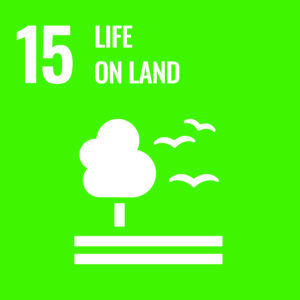
To celebrate the 17 days of competition at the Olympic Games Tokyo 2020, each day we will celebrate the power of sport and its influence in relation to each of the 17 Sustainable Development Goals (SDGs).
Today is dedicated to Goal 14: The official wording is: "Protect, restore and promote sustainable use of terrestrial ecosystems, sustainably manage forests, combat desertification, and halt and reverse land degradation and halt biodiversity loss". The Goal has 12 targets to be achieved by 2030. Progress towards targets will be measured by 14 indicators.
The nine "outcome targets" include: Conserve and restore terrestrial and freshwater ecosystems; end deforestation and restore degraded forests; end desertification and restore degraded land; ensure conservation of mountain ecosystems, protect biodiversity and natural habitats; protect access to genetic resources and fair sharing of the benefits; eliminate poaching and trafficking of protected species; prevent invasive alien species on land and in water ecosystems; and integrate ecosystem and biodiversity in governmental planning. The three "means of achieving targets" include: Increase financial resources to conserve and sustainably use ecosystem and biodiversity; finance and incentivize sustainable forest management; combat global poaching and trafficking.
- Sport offers a platform for education and promotion regarding the preservation of terrestrial ecosystems.
- Sport can promote awareness raising campaigns on biodiversity, including the dangers of the illegal trade in wildlife. It can contribute to preserve biodiversity through responsible lifestyle choices.
- Sport, through educational initiatives, can provide well-researched insights into the interactions between biodiversity and the lifestyle choices by explaining the interrelatedness of food, consumption, culture and biodiversity conservation.
- Sport in natural terrestrial settings can play an important role in ensuring the conservation and sustainable use of terrestrial ecosystems. Sport, especially outdoor sport, can incorporate safeguards, activities and messages promoting the sustainable and environmentally respectful use of terrestrial resources.
- Sport is associated to important values and proved to be an effective platform for values advocacy and education. It can therefore be used as a tool for the integration of ecosystem and biodiversity related values into development processes.
- The environmentally friendly organization of sport events, including the construction of sport facilities and infrastructure, can serve as a best practise model and provide sustainability assessment and recommendations on best practices to protect the ecosystem, e.g. prior to the construction of sport facilities for sport events. This comes with innovative solutions and the most resource efficient and clean energy initiatives.
Click here for a list of examples of how sport addresses the SDG 15
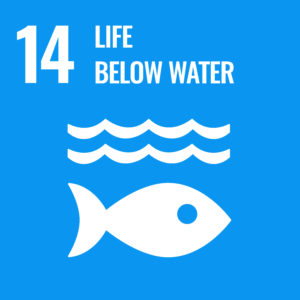
To celebrate the 17 days of competition at the Olympic Games Tokyo 2020, each day we will celebrate the power of sport and its influence in relation to each of the 17 Sustainable Development Goals (SDGs).
Today is dedicated to Goal 14: The official wording is to "Conserve and sustainably use the oceans, seas and marine resources for sustainable development". The Goal has ten targets to be achieved by 2030.
Progress towards each target is being measured with one indicator each.
The first seven targets are "outcome targets": Reduce marine pollution; protect and restore ecosystems; reduce ocean acidification; sustainable fishing; conserve coastal and marine areas; end subsidies contributing to overfishing; increase the economic benefits from sustainable use of marine resources. The last three targets are "means of achieving" targets: To increase scientific knowledge, research and technology for ocean health; support small scale fishers; implement and enforce international sea law.
- Sport-based education programmes can teach children and youth about environmental sustainability and climate change.
- Sport-based public awareness campaigns can promote awareness towards climate protection and can stimulate enhanced community response for local environment preservation. Sport, including sport events and stakeholders involved, can transmit messages regarding climate change and encourage policy developments in this context.
- Sport can help disaster recovery efforts through psychosocial support to affected individuals, especially children, by giving back a sense of normality, identity and belonging.
Equally, sport-based projects can support the relief of communities and reconstruction of facilities affected by natural disasters. - Sport can promote clean air in sport events through awareness raising campaigns, installation of air-pollution detectors and communication of results to the general public.
- Sport, through collaboration among a variety of involved stakeholders, can make significant contributions to combat climate change.
Click here for a list of examples of how sport addresses the SDG 14

To celebrate the 17 days of competition at the Olympic Games Tokyo 2020, each day we will celebrate the power of sport and its influence in relation to each of the 17 Sustainable Development Goals (SDGs).
Today is dedicated to Goal 13: The formal wording of Goal 13 is to "Take urgent action to combat climate change and its impacts". The Goal has targets to be achieved by 2030. Progress towards targets is measured by indicators.
The targets cover a wide range of issues surrounding climate action. There are five targets in total. The first three targets are "output targets": Strengthen resilience and adaptive capacity to climate-related disasters; integrate climate change measures into policies and planning; build knowledge and capacity to meet climate change. The remaining two targets are "means of achieving" targets: To implement the UN Framework Convention on Climate Change; and to promote mechanisms to raise capacity for planning and management. The United Nations Framework Convention on Climate Change (UNFCCC) is the primary international, intergovernmental forum for negotiating the global response to climate change.
Click here for a list of examples of how sport addresses the SDG 13
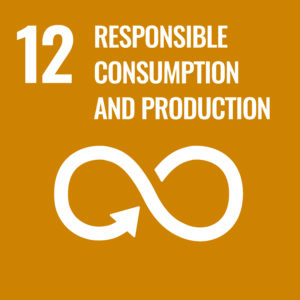
To celebrate the 17 days of competition at the Olympic Games Tokyo 2020, each day we will celebrate the power of sport and its influence in relation to each of the 17 Sustainable Development Goals (SDGs).
Today is dedicated to Goal 12: The official wording of SDG 12 is "To ensure sustainable consumption and production patterns". SDG 12 is meant to ensure good use of resources, improving energy efficiency, sustainable infrastructure, and providing access to basic services, green and decent jobs and ensuring a better quality of life for all. SDG 12 has 11 targets to be achieved by at least 2030 and progress toward the targets is measured using 13 indicators.
The 11 targets of the goal are: implement the 10‑Year Framework of Programs on Sustainable Consumption and Production Patterns; achieve the sustainable management and efficient use of natural resources; reducing by half the per capita global food waste at the retail and consumer levels and the reduction of food losses along production and supply chains, including post-harvest losses; achieving the environmentally sound management of chemicals and all wastes throughout their life cycle; reducing waste generation through prevention, reduction, recycling and reuse; encourage companies to adopt sustainable practices; promote public procurement practices that are sustainable; and ensure that people everywhere have the relevant information and awareness for sustainable development. The three "means of achieving" targets are: support developing countries to strengthen their scientific and technological capacity; develop and implement tools to monitor sustainable development impacts; and remove market distortions, like fossil fuel subsidies, that encourage wasteful consumption.
- Sport can promote sustainable consumption and production through education and awareness raising campaigns. The popularity and outreach of sport offer opportunities for awareness raising and information sharing, including sustainable development and nature friendly lifestyles. Messages and awareness raising campaigns concerning sustainable consumption and production can be disseminated through sport products, services and events.
- The incorporation of sustainability standards in the production and provision of sport products can contribute to sustainable consumption and production patterns, also involving other industries.
- With regard to natural resources, their sustainable management and efficient use can be enhanced in sport contexts. Sport-based activities involving natural resources, such as outdoor sport, can be platforms to promote the responsible use of natural resources.
- Sport can encourage sustainable tourism and lifestyles as well as sustainable tourism products and services for instance in host cities of sport events. Sport can educate tourists on ways to minimize their travel footprint and promote eco-mobility for example when attending
- sport events. It can build capacities in tourism and engage relevant stakeholders in sustainable practices which report their impacts on the environment.
Click here for a list of examples of how sport addresses the SDG 12

Global Leaders gather at Sport Integrity Week 2021 to shape the Future of the Sporting Industry
SIGA
Following the resounding success and global acclaim of last year’s inaugural Sport Integrity Week, SIGA announces the #SIW2021 edition, the world’s premier thought leadership digital event fully focused on Sport Integrity. The #SIW2021 will take place over five action-packed days (13 – 17 September 2021), across a World Stage and six Continental Stages (America, Latin America, Europe, Africa, and Oceania).
Promoting global solutions to global problems through regional approaches, SIGA’s flagship event will bring together the whole sporting industry, including senior executives, thought leaders, forwardthinkers, key policy-makers, law enforcement authorities, global sponsors, media, and all those who want to see sport and the wider industry be governed and operated under the highest integrity standards.
This is much more than a consumption orientated talking shop! Comprising a series of world-class and interactive debates, high-profile one-to-one sessions with some of the most influential global industry leaders and insightful keynote speeches, the Sport Integrity Week 2021 is underpinned by dynamic engagement, networking and mechanisms that will drive collaboration, future projects and initiatives. All intended to deliver, in a collaborative, inclusive and unified way, the much-need reforms that will overcome the most pressing challenges facing the global sporting industry.
The first 10 confirmed speakers require no introduction.They are:
• Javier Tebas, President, La Liga
• Alison Giordano, Vice President, Global Sponsorships and Content Marketing, Mastercard
• Lorenzo Salazar, Vice-Chair, Working Group on Bribery in International Business, OECD
• Andrea Traverso, Director, Financial Sustainability & Research, UEFA
•David Butler, General Manager, European Rugby League
• Paul Elliott, Chair, Inclusion Advisory Board, The FA
• Mark Lichtenhein, Chairman, Sports Rights Owners Coalition (SROC)
• Ralf Reichert, Co-founder & Co-CEO, ESL Gaming
• Stacey Copeland, Former English professional boxer and football player | female superwelterweight Commonwealth Boxing Champion | SIGA Champion
• Pedro Duarte, Director, Corporate, External & Legal Affairs, Microsoft Corporation
Commenting the launch of the Sport Integrity Week 2021, SIGA’s Global CEO Emanuel Macedo de Medeiros, stated: “As we all look to overcome the consequences of the devastating global pandemic, SIGA is more committed than ever to mobilizing and unifying all sectors of the sporting industry, to not only deliver Recovery with Integrity, but to use this opportunity to move from despair to optimism and evolve in positive and meaningful ways. Sport is coming back to the pitches, courts, and tracks.
This is a moment to celebrate, but equally to assume responsibilities, tackle the problems heads on, without excuses, and set in motion long overdue integrity reforms. Sport is being played again in open fields, under the lights, in fronts on millions, all over the world. It must be governed the same way: with integrity, transparency, and accountability.
This is what the fans deserve, the global business community expects, and sport is all about! Bringing together all sides of the global sporting industry, from all continents and all sports, the Sport Integrity Week is a dynamic, multi-cultural space of dialogue, knowledge sharing and thought leadership. It is the perfect platform to make things happen.
Last year’s inaugural Sport Integrity Week was undoubtedly a huge success, with more than 1200 delegates and more than 250 speakers. This year, we will be even more inclusive, more engaging and more action-orientated. We cannot wait to get started! As you can see from the first 10 names we are disclosing this morning – experts from the top of their fields, representing the most impactful, forward-thinking organisations, are fully engaged, and ready to go. This is only a small taste of what is to come! So, come along and be part of this growing independent global movement for change. Join us. Support our Sport Integrity Goals and participate in the #StandWithSIGA campaign.
The Sport Integrity Week will address a specific and complementary topic every day:
Day 1 – 13 Sept: Good Governance, Anti-Corruption & International Cooperation in Sport
Day 2 – 14 Sept: Financial Integrity, Transparency & Sustainability in Sport
Day 3 – 15 Sept: Sports Betting Integrity
Day 4 – 16 Sept: Global Business, Media and Technology in Sport
Day 5 – 17 Sept: Youth Development and Protection in Sport
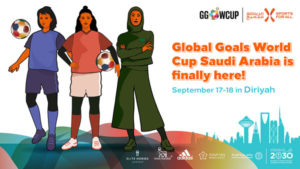
Sport and social activism come together as all-female football teams prepare to compete at the inaugural of Global Goals World Cup Saudi Arabia
(Riyadh, Saudi Arabia) August 30, 2021 – The final tournament of Saudi Arabia’s inaugural Global Goals World Cup will take place in Riyadh in September, showcasing […]


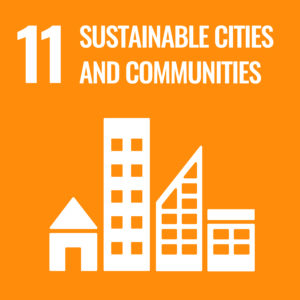
To celebrate the 17 days of competition at the Olympic Games Tokyo 2020, each day we will celebrate the power of sport and its influence in relation to each of the 17 Sustainable Development Goals (SDGs).
Today is dedicated to Goal 11: The SDG 11 is to "Make cities inclusive, safe, resilient and sustainable". The targets of SDG 11 include investment in public transport, creating green public spaces, and improving urban planning and management in participatory and inclusive ways.
SDG 11 has 10 targets to be achieved, and this is being measured with 15 indicators. The seven "outcome targets" include: Safe and affordable housing, affordable and sustainable transport systems; inclusive and sustainable urbanization; protect the world's cultural and natural heritage; reduce the adverse effects of natural disasters; reduce the environmental impacts of cities; provide access to safe and inclusive green and public spaces. The three "means of achieving" targets include: Strong national and regional development planning; implement policies for inclusion, resource efficiency and disaster risk reduction; support least developed countries in sustainable and resilient building.
- Sport can advocate for and contribute to provide inclusive, safe, green and cohesive settlements which are usable for sport and other physical activities. Affordable and accessible sport infrastructures, facilities and related services can contribute to creating inclusive, safe and healthy communities.
- Sport can promote the use of public spaces where diverse populations and marginalized community members can interact and create friendly relations. Sport can reduce antisocial behaviour through the provision of facilities and opportunities in areas affected by poverty, disengagement and low social development.
- Sport can be used to integrate refugees and migrants into communities. Refugee camps, Internally Displaced People locations, and urban locations can include people of all ages, ethnicities and origins.
- Sport can raise awareness with regard to equal rights and inclusive settlements for people with disabilities, the elderly, women and girls, and other vulnerable groups and individuals.
- Sport can help eliminate obstacles and barriers in the environment, transportation, public facilities and services to ensure that people facing those barriers such as persons with disabilities can access sport and physical activities.
- Sport can enhance the sustainable development of cities by building facilities with the most enhanced resource and energy efficiency, and by assessing policies and procedure with procurement standards labelling.
Click here for a list of examples of how sport addresses the SDG 11
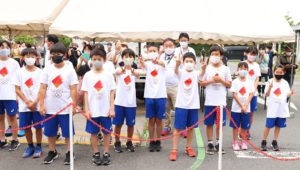
Power to the people: Tokyo 2020 set to replicate the legacy of 1964
From trying new sports to supporting the Olympic Torch Relay from afar and donating their old mobile phones to be used to create Olympic […]





To celebrate the 17 days of competition at the Olympic Games Tokyo 2020, each day we will celebrate the power of sport and its influence in relation to each of the 17 Sustainable Development Goals (SDGs).
Today is dedicated to Goal 10: This goal has ten targets to be achieved by 2030. Progress towards targets will be measured by indicators. The first seven targets are "outcome targets": Reduce income inequalities; promote universal social, economic and political inclusion; ensure equal opportunities and end discrimination; adopt fiscal and social policies that promotes equality; improved regulation of global financial markets and institutions; enhanced representation for developing countries in financial institutions; responsible and well-managed migration policies. The other three targets are "means of achievement" targets: Special and differential treatment for developing countries; encourage development assistance and investment in least developed countries; reduce transaction costs for migrant remittances.
- The right to equality and non-discrimination is a cornerstone of international law. Sport can promote equality and can serve as a platform to promote the value of diversity. Stakeholders in sport can amplify the message of equality and respect for diversity.
- Sport, including sport events, can be used to celebrate and value diversity. Stakeholders in sport can promote mutual understanding and address discriminatory practices and various forms of discrimination. Sport stadia that serve as stages for human behaviour can become platforms for human rights based inclusiveness and respect for diversity.
- Sport is recognized as a contributor to the empowerment of individuals, such as women and young people, and communities. Participation in sport offers opportunities for the empowerment of people with disabilities; it showcases ability, not disability, thus raising awareness and promoting respect. Sport can therefore be effectively used for the inclusion of all irrespective of age, sex, race, ethnicity, origin, sexual orientation, gender identity, religion or economic or other status.
- Equal opportunities can be achieved in and through sport by raising awareness towards existent inequalities and establishing sport-related policies and programmes aimed at reducing them.
- The popularity of, and positive attitude towards sport make it a suitable tool for tackling inequality in areas and populations that are difficult to reach. It can also tackle prejudice an intolerance by promoting tolerance and pro-social behaviour instead.
Click here for a list of examples of how sport addresses the SDG 10